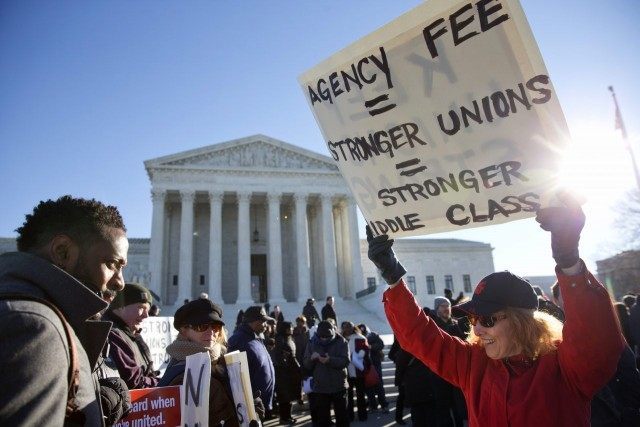WASHINGTON — Conservatives suffered their first major loss Tuesday resulting from the death of Justice Antonin Scalia, as the Supreme Court deadlocked 4-4 on the First Amendment rights of teachers unions’ members.
California law requires public-school teachers to contribute part of their paychecks to local teachers’ unions to subsidize what the unions claim is collective bargaining for wages and benefits. The law also requires teachers who do not want unions to spend their money on liberal political activism to step forward to file an objection, and to renew that objection in writing every year.
In its 1977 case Abood v. Detroit Board of Education, the Supreme Court held that such compelled political speech does not violate the free-speech rights of Americans who work in such jobs. It was an era in which First Amendment rights—including speech, press, and religious liberty—were viewed in narrower terms than today.
But in two cases in recent years, as more conservative free-speech principles have gained majority support among the justices, the Supreme Court has held that various mechanisms forcing citizens to fund speech they oppose violate their fundamental rights. In the most recent one, Harris v. Quinn, Justice Samuel Alito wrote for the that Court that except in extraordinary circumstances, “no person in this country may be compelled to subsidize speech by a third party that he or she does not wish to support.”
Rebecca Friedrichs is an elementary school teacher in California whose suggestions the teachers union routinely rejected. As a consequence, she objected to the union taking part of her paycheck to fund speech that she personally opposed.
One of the most successful Supreme Court litigators in the nation, Michael Carvin from Jones Day, argued her case before the High Court, asking the Court to overrule Abood.
It is now clear that Friedrichs would have won her case 5-4. But while the justices privately vote after a case is argued, and then someone writes the Court’s opinion, they must vote a final time after the full opinion is written to make the decision final, since occasionally a justice will switch his vote during the writing process.
With Scalia’s untimely passing, the Court tied 4-4, which means that there is no Supreme Court-level decision for the entire nation, and instead the lower court’s decision remains in place for the states under that inferior court’s jurisdiction. Consistent with Abood, the Ninth Circuit Court of Appeals had ruled in favor of the union, and that decision will stand.
As a consequence of this decision, the California Teachers Association can keep compelling its members to pay union dues, and the union may continue supporting political causes that some of its members oppose.
The case is Friedrichs v. California Teachers Union, and serves as a reminder of what is at stake in the 2016 presidential election, since Scalia’s seat will likely be filled by the next president.
Ken Klukowski is legal editor for Breitbart News. Follow him on Twitter @kenklukowski.

COMMENTS
Please let us know if you're having issues with commenting.